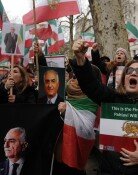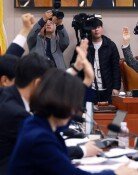Who watches the watchmen?
The 1998 American spy-thriller movie Enemy of the State begins with a scene in which an artificial satellite orbit the earth watching every move made by people living on the ground. The protagonist, who is a lawyer caught up in a conspiracy, is chased by intelligence agents without knowing why. His financial transactions are suspected, and his mobile phone is traced. The U.S. National Security Agency (NSA) is chasing him because he was accidentally given a video clip showing the NSA assassinating a Senator who opposed new legislation that dramatically expands the surveillance powers of intelligence agencies. Edward Snowdens leaks on NSA surveillance shows that such a situation is not just a fiction but could become a reality.
While the Central Intelligence Agency is well-known as a U.S. intelligence agency, informed people know that the NSA is actually more powerful. Although the NSA monitors all communications signals on the earth, its existence is veiled. Some people even jokingly say that the NSA stands for No Such Agency. The agency monitors all signals that traverse the earth, including wired and wireless communications, encoded diplomatic cables and radioactive signals. Snowden exposed the NSAs secret data mining PRISM program, which spies on e-mail messages, phone conversations, photos and videos of innocent ordinary users from major Internet companies including Google, Facebook, Apple and YouTube. As the NSA is said to collect records on 3 billion phone calls every day, there are few people who are free from the agencys surveillance networks. Indeed, we are living with a big brother.
A former CIA employee and a technical contractor for the NSA, Snowden noted that he decided to blow the whistle on the surveillance system, saying, I don`t want to live in a world where everything that I say, everything I do, everyone I talk to, every expression of creativity, or love, or friendship is recorded. The fact that the NSAs wiretapping began after the Sept. 11 terrorist attacks shows the purpose is to prevent terrorism.
As a former intelligence agent, Snowden must have been aware of the importance of national security. However, he believed that whether to allow wiretapping for national security should be decided by the public, not the state. Still, we cannot say that he is right because exposed intelligence loses its intelligence value. His act entailed a hefty price for the U.S., as al Qaeda has changed its communication signals.
In Korea, people who support installing closed-circuit television devices at schools, parking lots and on streets outnumber opponents. The desire to live in a safe world makes people accept sacrificing privacy. The question of which has priority over the other between national security and privacy does not have an absolute value. The answer can change depending on the situation and peoples perception.
The question lies in that there is no guarantee that intelligence gathered by intelligence agencies will be used for the intended purpose only. The NSA is under suspicion that it used intelligence gathered through its Echelon system to steal other countries state-of-the-art industrial technologies or for international negotiations. Even if we tolerate intelligence agencies collecting intelligence not only for national security but also for their countries economic interest, we should be aware that there are countless cases in which such intelligence was used to protect the interest of some individuals and regimes.
Surely, privacy and freedom are important values. However, it is hard to see them as absolute standards in a world where one cannot live alone. What Snowden did not see was that the anxiety and fear modern people have living in this world have been growing large enough to overshadow privacy. There are controversies over whether he is an immature boy or a passionate young man with a good sense of justice. Still, what he did was meaningful in reminding us of the fact that unwatched power can take a wrong path any time. A Latin phrase Quis custodiet ipsos custodes? (Who watches the watchmen?) is a valid question not only for the NSA but also for Koreas National Intelligence Service, which is at the center of political controversies over its alleged intervention in last years presidential election and the disclosure of a transcript of the 2007 inter-Korean summit.







